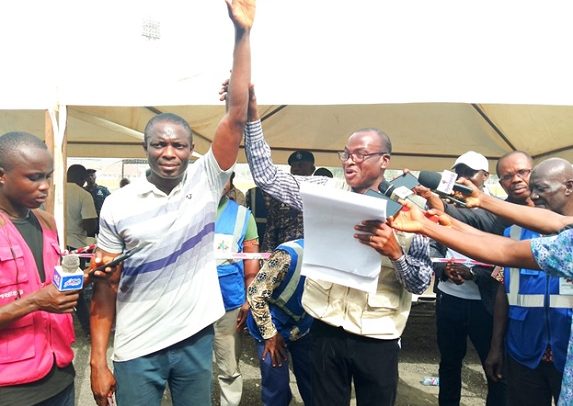
r
When then ministerial nominee for the Ministry of Roads and Highways, Kwasi Amoako-Attah, appeared before the Parliamentary Vetting Committee in February, he told members and indeed all Ghanaians that he will ensure that all toll booths in the country are automated to ensure accountability for revenues collected.
According to him, "... If you take all the toll booths in the country as at now, we have 35 of them nationwide, and out of this 35, it is only four that are automated, and the four are the Ngleshie Amanfrom, Accra Plaza, Tema Plaza and the Amasaman booth.
"What I will do to improve on the toll collection is to improve on the automation of many of them as possible. I will ensure that those that can be automated will be automated to improve toll collection," he said.
This, a former Roads and Highways minister, Joe Gidisu, agreed with saying that singular move will ensure accountability for revenues collected and would help reduce the road arrears accrued by the state.
Mr. Amoako-Attah, during his vetting revealed that road arrears for the Ghana Highways Authority, Feeder Roads and Urban Roads as of December 31, 2016, stood at GH¢17 billion, adding that the Road Fund generated only GH¢1.2 billion yearly, thus establishing a funding gap.
According to Mr. Gidisu, there are roads which qualify but are yet to be automated like the ones on the Kumasi and Sunyani roads.
One opposition that the idea of more automated toll booths has faced is the perception that their introduction would lead to more vehicular congestion which the former minister disagrees with noting that some innovations introduced will bypass this problem.
He recounted that at the Tema Motorway, traffic used to build up till the introduction of the e-switch; where regular road users could prepay for tickets and use dedicated lanes. "We had a particular lane dedicated to the e-switch for regular users of the motorway so they do not have to wait at the toll booth to pay."
The former minister agreed in totality that "... These are some of the innovations we introduced to reduce the frustration of congestion that you are talking about... it is one of the very effective ways we can mobilise funds for the road sector and the returns will be far greater in helping to reduce the tension on the road budget," the former Roads and Highways minister said.
But what is automated road tolling? The concept might be strange to many Ghanaian motorists who are used to the present system whereby they stop and pay manually at the toll gates.
Introducing the automated road tolling will bring to an end the existing ticket-based system as the electronic toll systems would certainly address the revenue leak problem.
This coupled with the introduction of private operators for tolling is likely to introduce a further element of efficient financial and operational management thereby reducing revenue leakage and raking in significant income for the government.
The introduction of an automated road tolling system would also fall in line with government's plan to digitalise the economy as the state will be able to track all financial transactions made at the toll booths.
The problem of Open Road Tolling (ORT) in Ghana is the cost and impossibility of enforcement necessitating the need to introduce private operators who will be handed a performance-based contract and best practices in terms of financial management thereby guaranteeing to the state 99.99% of revenue collected.
For the uninitiated, it should be understood that these systems rely on four major components: automated vehicle identification, automated vehicle classification, transaction processing, and violation enforcement to perform efficiently, though any combination of the three is critical to its successful application.
The ORT system will lead to the introduction of an axle-based classification as opposed to the current weight-based one, which will bring to an end the ticket-based system leading to the introduction of an electronic toll system that includes both classification by a toll collector using an Automatic Vehicle Classifier (AVC) with a supervisor present to resolve any vehicular class discrepancy.
In countries that have put these systems in place the tolls collected were used to improve the road corridors leading to the toll plazas with adequate safety and security measures in place to protect the road users.
The expansion of the approaches to the existing toll booths into more lanes to reduce processing time will also lead to the intelligent system installed to block all loopholes associated with the current regime.
Part of the revenue can also be used for routine road maintenance (RRM) which is critical for sustaining the quality and safety of roads in line with the original design and minimising life-cycle as well as associated road user costs. Unfortunately, what Ghana has earned from the toll booths have never been sufficient to perform such a crucial function.
However in countries with the necessary facilities to maximize their profit from the booths, funds from the RRM have been used to perform a range of small scale yet critical activities, such as clearing of vegetation along the roads, cutting back encroaching vegetation, cleaning of silted ditches and culverts and cleaning of all drainage structures, as well as clearing bridge drainage ports and scuppers among many others.
In Ghana, it is estimated that the Ghana Highway Authority (GHA) makes GH?48,000 daily at the toll booths on the Accra-Tema Motorway though this can be substantially increased if automated tolling is introduced.
Even though officials at the Ghana Road Fund (GRF), Ministry of Roads and Highway, GHA and Angel Data and Telecom Services (AD&TS) were not forthcoming with the figures on their daily income, it is believed the road generates enough revenue to see to its periodic and routine maintenance including rehabilitation, upgrading, road safety activities and other road projects to be carried out by the GHA, Department of Feeder Roads and Roads Safety Commission.
It is therefore necessary that government takes a second look at properly automating the Accra-Tema Motorway toll booths with a view to reducing revenue leakage and raking in significant income for development since the system in place has failed to reduce vehicle congestion on the Accra-Tema Motorway, as there is always a long queue of vehicles all patiently waiting to pay their tolls and move on.
This can be reversed if the state will take a second look at the way the toll booths are being operated because it is believed that there is more to be done to ensure that the state reaps the maximum benefit from this source which unfortunately has been left unattended to for others to reap where they have not sown.
Read Full Story

















Facebook
Twitter
Pinterest
Instagram
Google+
YouTube
LinkedIn
RSS